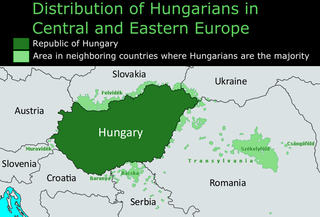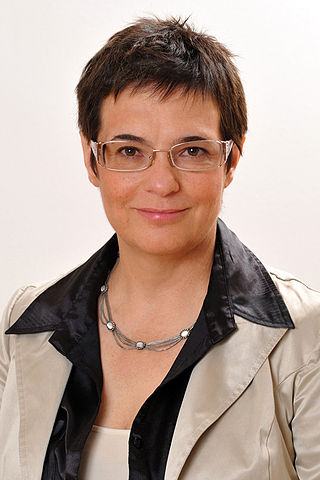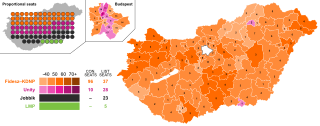
Fidesz – Hungarian Civic Alliance is a right-wing populist and national-conservative political party in Hungary, led by Viktor Orbán.

Viktor Mihály Orbán is a Hungarian politician who has served as prime minister of Hungary since 2010, previously holding the office from 1998 to 2002. He has presided over Fidesz since 1993, with a brief break between 2000 and 2003.

Pál Schmitt is a Hungarian Olympic fencer and politician who served as President of Hungary from 2010 until his resignation in 2012, following his academic misconduct controversy.

Katalin Szili is a Hungarian politician and jurist, a former Member of the National Assembly, who served as Speaker of the National Assembly from 2002 to 2009.

The Jobbik – Conservatives, commonly known as Jobbik, is a conservative political party in Hungary.
The Fundamental Law of Hungary, the country's constitution, was adopted by parliament on 18 April 2011, promulgated by the president a week later and entered into force on 1 January 2012. It is Hungary's first constitution adopted within a democratic framework and following free elections.

Hungarian diaspora is a term that encompasses the total ethnic Hungarian population located outside current-day Hungary.
Telecommunications in Hungary include radio, television, fixed and mobile telephones, and the Internet.
Magyar Hírlap is a former Hungarian daily newspaper that operates exclusively online since 11 July 2022. Owned by conservative entrepreneur Gábor Széles, Magyar Hírlap supports political parties of Hungary with conservative values, whereas it was known for its liberal stance until 2006.

György Matolcsy is a Hungarian politician and economist, current governor of the Hungarian National Bank (MNB). He also served as Minister of National Economy from 2000 to 2002 during the first cabinet of Viktor Orbán and from 2010 to 2013 in the Second Orbán Cabinet.

Echo TV was a Christian-conservative Hungarian television channel owned and operated by Echo Hungária TV Zrt, and founded in 2005 to cover business news. Later focusing on news broadcasting and public affairs, it was known as a supporter of Fidesz and KDNP.
Local elections took place in Hungary on 1 October 2006 amidst a period of protests and demonstrations against the government of Prime Minister Ferenc Gyurcsány. In many cities, demonstrators urged people not to vote for the MSZP candidate at the elections, and Fidesz made heavy use of the fact that Gyurcsány had admitted lying in its campaign leaflets and phone calls.

Annamária Szalai was a Hungarian journalist, politician, Member of Parliament (MP) for Zala County, Fidesz (1998–2004). She became a member of the National Radio and Television Commission (ORTT) in 2004, and as a result resigned from her parliamentary seat. Szalai served as President of the National Media and Infocommunications Authority (NMHH) from 2010 until her death.

Parliamentary elections were held in Hungary on 6 April 2014. This parliamentary election was the 7th since the 1990 first multi-party election. The result was a victory for the Fidesz–KDNP alliance, preserving its two-thirds majority, with Viktor Orbán remaining Prime Minister. It was the first election under the new Constitution of Hungary which came into force on 1 January 2012. The new electoral law also entered into force that day. For the first time since Hungary's transition to democracy, the election had a single round. The voters elected 199 MPs instead of the previous 386 lawmakers.

Parliamentary elections were held in Hungary on 3 April 2022 to elect the National Assembly, coinciding with a referendum.

Magyar Idők was a short-lived national conservative Hungarian newspaper, associated with the Fidesz government.

Origo is a major Hungarian-language news website founded in 1998 by telecommunications company MATÁV. In 2018, Origo was the third most visited Hungarian website. Since 2015, Origo has been regularly criticised by the left for its uncritical support of the Fidesz political party. Multiple critics described the website as "state-run propaganda", prone to operate with the same keywords for emotional mobilization as other news outlets with close ties to Fidesz.
Events in the year 2021 in Hungary.

Elk*rtuk is a 2021 Hungarian political drama action thriller film, centered around the 2006 Öszöd speech, made by former Hungarian Prime Minister Ferenc Gyurcsány, the leaking of said speech, and its subsequent consequences. It was directed by Keith English.
The Hungarian conservative party Fidesz has been accused of exhibiting anti-democratic and authoritarian tendencies since their return to leading the Hungarian government in 2010 under the leadership of Viktor Orbán in his second premiership. The Fidesz-led government has been accused of severely restricting media freedom, undermining the independence of the courts, subjugating and politicising independent and non-governmental institutions, surveilling political opponents, engaging in electoral engineering, and assailing critical NGOs. The Fidesz-led government has been accused of engaging in cronyism and corruption. Fidesz has been accused of antisemitism, and the Fidesz-led government has been accused of passing legislation that violates the rights of LGBT persons. Due to its controversial actions, Fidesz and its government have come in conflict with the EU on multiple occasions.














